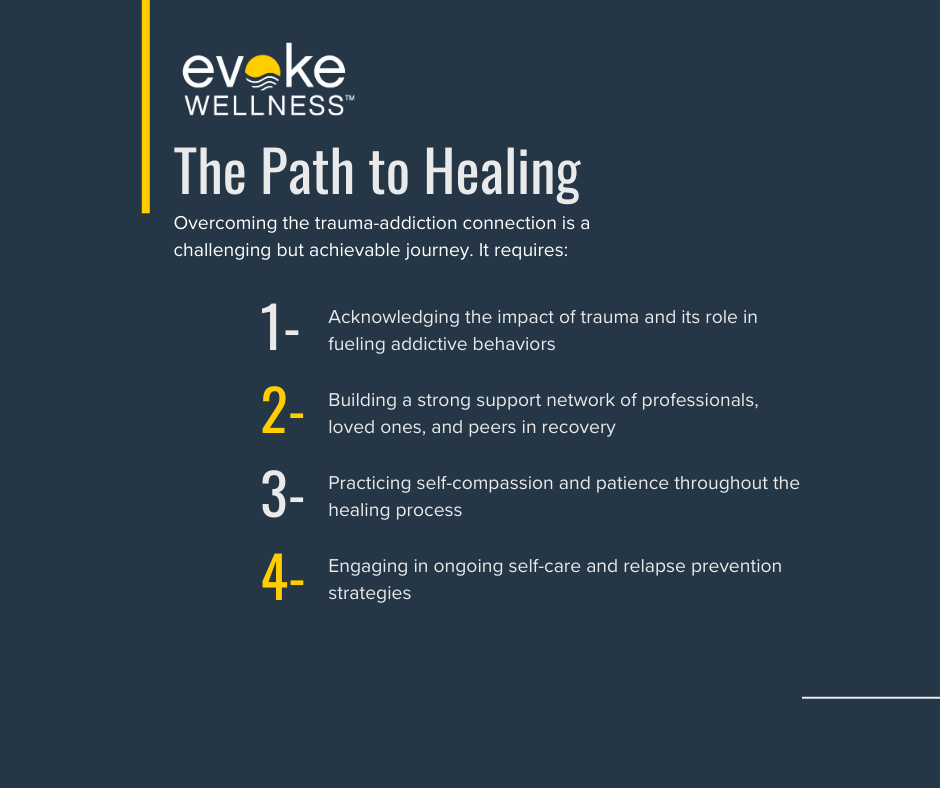Understanding the profound impact of trauma on addiction recovery is crucial for your journey to lasting sobriety. As you embark on the path to wellness, it’s essential to recognize how past experiences shape your detoxification process and long-term outcomes. Recent studies have shown that up to 75% of individuals seeking substance abuse treatment have experienced significant trauma. This article will explore the intricate relationship between trauma, alcohol detox, medical detox, residential treatment, and dual diagnosis approaches. By delving into the latest research and evidence-based practices, you’ll gain valuable insights into how addressing trauma can enhance your recovery experience and improve your chances of sustained success in overcoming addiction.
Together, let’s embrace the journey to recovery and the promise of a new beginning. Call us at (833) 503-0734 today or reach out online.
The Connection between Trauma and Addiction
The Trauma-Addiction Cycle
Trauma and addiction often go hand-in-hand, with unresolved traumatic experiences being a significant risk factor for developing substance abuse issues. According to the National Institute on Drug Abuse, individuals with a history of childhood abuse or neglect are at an increased vulnerability for drug addiction.
Traumatic events can trigger intense emotional pain, anxiety, depression, and post-traumatic stress disorder (PTSD). To cope with these overwhelming feelings, some individuals turn to alcohol or drugs as a means of self-medicating and numbing their distress. However, this temporary relief often spirals into a vicious cycle of addiction and further trauma.
Identifying and Treating Co-Occurring Disorders
Addiction and trauma frequently co-occur, and addressing both conditions simultaneously is crucial for effective treatment and long-term recovery. Evoke Wellness at San Marcos offers comprehensive dual diagnosis treatment, which involves:
- Medically-supervised detox to safely withdraw from substances
- Trauma-focused therapies, such as EMDR and cognitive processing therapy, to process traumatic memories and develop coping strategies
- Individual and group counseling to address underlying issues and build a support system
- Holistic approaches like mindfulness, yoga, and art therapy to promote healing and self-regulation
By integrating evidence-based addiction treatment with trauma-informed care, individuals can break the cycle of self-medication, develop healthier coping mechanisms, and achieve lasting recovery.
With the right treatment approach, individuals can process traumatic experiences, develop resilience, and reclaim their lives from the grip of addiction. Evoke Wellness at San Marcos offers a comprehensive continuum of care to support individuals on their journey towards recovery and healing.
How Trauma Affects Addiction Recovery
Trauma can have a profound impact on an individual’s ability to achieve and maintain lasting recovery from addiction. Unresolved traumatic experiences often contribute to substance abuse as a maladaptive coping mechanism, making it more difficult to break the cycle of addiction.
Trauma’s Influence on the Recovery Process
- Trauma can lead to increased stress, anxiety, and difficulty regulating emotions, all of which can trigger cravings and relapse in addiction recovery.
- Individuals with a history of trauma may turn to drugs or alcohol as a means of self-medicating and numbing painful memories or emotions, perpetuating the cycle of addiction.
- Untreated trauma can significantly impede the recovery process, as individuals may struggle to develop healthy coping strategies and effectively engage in addiction treatment.
Addressing Trauma in Comprehensive Treatment
To increase the chances of achieving and maintaining sobriety, it is crucial to address the impact of trauma through comprehensive addiction treatment programs that incorporate trauma-informed care.
- Evidence-based therapies like EMDR (Eye Movement Desensitization and Reprocessing) can help individuals process and heal from traumatic experiences, reducing the risk of relapse.
- Dual diagnosis treatment, which addresses both substance abuse and co-occurring mental health disorders like PTSD, is often necessary for individuals with trauma histories.
- Holistic approaches, such as mindfulness practices, can complement traditional therapies by promoting emotional regulation and stress management.
By addressing the underlying trauma that often fuels addiction, individuals can develop healthy coping mechanisms, improve their mental health, and increase their chances of achieving and maintaining long-term recovery.
Effects of Trauma on the Brain
Lasting Neurological Impact
Traumatic experiences can have profound and long-lasting effects on the brain’s structure and function. Studies show that trauma, especially during childhood, can disrupt normal brain development and lead to changes in key regions like the hippocampus, amygdala, and prefrontal cortex. According to research, these traumatic memories can become “stuck” in the brain, causing individuals to re-experience distressing symptoms like flashbacks, nightmares, and anxiety.
Heightened Stress Response
Trauma can also significantly alter the brain’s stress response system. The amygdala, which plays a crucial role in processing fear and emotional reactions, may become hyperactive. This can lead to a heightened state of arousal, making it difficult for individuals to regulate their emotions and cope with stress effectively. As noted by Evoke Wellness, addressing underlying trauma is essential in treating substance abuse and co-occurring mental health conditions.
Impaired Executive Function
Executive function, which encompasses cognitive processes like decision-making, problem-solving, and emotional regulation, can be impaired in individuals who have experienced trauma. The prefrontal cortex, responsible for these higher-order functions, may be affected, leading to difficulties in planning, focusing, and controlling impulses. This can contribute to the challenges faced during detox and recovery, where individuals must navigate intense cravings and emotional fluctuations.
Comprehensive Treatment Approach
Addressing the neurological impacts of trauma is crucial for successful addiction recovery. Therapies like EMDR (eye movement desensitization and reprocessing) can help individuals reprocess traumatic memories and reduce associated distress. Integrating trauma-informed care, cognitive-behavioral therapy, and holistic modalities within a medical detox program can support individuals in managing withdrawal symptoms, building coping strategies, and promoting overall healing.
Steps to Navigate Trauma Triggers During Medical Detox
The detox process is a crucial first step in overcoming addiction, but it can also be a vulnerable time for those with trauma histories. As substances leave the body, past traumas may resurface, triggering overwhelming emotions and cravings. Navigating these triggers is essential for a successful recovery journey.
Identify Your Triggers
Self-awareness is key. Spend time reflecting on your experiences and recognizing the people, places, emotions, or situations that may act as trauma triggers. Developing this understanding can help you better manage cravings and urges when they arise.
Develop Coping Strategies
Once you’ve identified your triggers, work with your therapist to develop healthy coping mechanisms. Techniques like mindfulness, deep breathing exercises, and grounding techniques can help you stay present and regulate your emotions. Evoke Wellness’ relapse prevention program also emphasizes cognitive-behavioral therapy (CBT) to challenge negative thought patterns.
Create a Safe Environment
Your surroundings can play a significant role in managing triggers during detox. As suggested by Evoke Wellness, creating a calm, stress-free environment can aid the process. This may involve minimizing potential triggers, ensuring a clean and comfortable living space, and engaging in relaxing activities.
Seek Professional Support
Trauma-informed care and specialized therapies like EMDR can be invaluable in addressing the root causes of your addiction and managing trauma triggers. Evoke Wellness’ medical detox program integrates these approaches to support your physical, psychological, and emotional needs during this critical phase.
Build a Support Network
Surrounding yourself with a supportive community can provide accountability, encouragement, and a shared understanding of the challenges you face. Consider attending support groups or involving loved ones in your recovery journey, as they can offer practical assistance and celebrate your progress.
By taking proactive steps to navigate trauma triggers during medical detox, you can increase your chances of successfully completing the detox process and transitioning into comprehensive addiction treatment for lasting recovery.
The Importance of Post-Medical Detox Support
Continuing the Recovery Journey
Completing a medical detox program is a vital first step towards overcoming addiction. However, detox alone is not enough to achieve long-term sobriety. Comprehensive post-detox support is crucial for sustaining the progress made during detox and addressing the underlying psychological and behavioral aspects of substance abuse.
A Continuum of Care
After detox, individuals are highly vulnerable and require ongoing guidance to prevent relapse. This continuum of care may include:
- Transitioning into a residential treatment program for structured therapy and a supportive, substance-free environment.
- Participating in an intensive outpatient program (IOP) or partial hospitalization program (PHP) for continued counseling and support while living at home.
- Engaging in evidence-based therapies like cognitive-behavioral therapy (CBT) and dialectical behavior therapy (DBT) to develop coping strategies and address root causes of addiction.
- Attending peer support groups, such as 12-step programs, for accountability, encouragement, and a sense of community.
Holistic Healing and Aftercare
A comprehensive approach to post-detox support should also incorporate holistic healing methods and aftercare planning:
- Mindfulness practices, nutrition counseling, and fitness activities can promote overall well-being and aid in physical and emotional recovery.
- Developing an aftercare plan can outline continuing care recommendations, such as sober living arrangements, alumni programs, and access to community resources.
- Consistent therapy and check-ins with addiction professionals can help individuals navigate challenges and maintain their commitment to sobriety as they transition back into daily life.
By providing a structured, multi-faceted support system after detox, individuals can increase their chances of achieving lasting recovery and rebuilding a fulfilling, substance-free life.
How Trauma Impacts the Detox Process and Recovery Outcomes FAQ
Trauma and Substance Abuse
For many struggling with addiction, unresolved trauma can fuel the cycle of substance abuse as a coping mechanism. This dangerous pattern often leads to a heightened risk of relapse during detox and recovery. Addressing the root causes of trauma is crucial for lasting sobriety.
Withdrawal Challenges
The detox process can reawaken traumatic memories, triggering intense psychological distress. Individuals with a history of trauma may experience heightened anxiety, depression, and difficulty regulating emotions during withdrawal. This underscores the need for comprehensive, trauma-informed care.
Barriers to Treatment
Unresolved trauma often creates barriers to seeking and engaging in addiction treatment. Many struggle with stigma, shame, and a lack of trust in the treatment process. Trauma-sensitive approaches that prioritize safety and empowerment are vital for successful recovery outcomes.
Integrated Care Approach
Effective treatment must address both addiction and co-occurring trauma. At Evoke Wellness, our experienced clinical team integrates evidence-based therapies like EMDR, cognitive-behavioral therapy, and dialectical behavior therapy to promote healing from trauma while managing substance abuse disorders.
Through this comprehensive, individualized approach, individuals can process traumatic experiences, develop coping strategies, and build resilience – essential components for sustained recovery and improved quality of life.
Conclusion
In conclusion, understanding the profound impact of trauma on detox and recovery is crucial for effective treatment. By addressing trauma alongside substance use disorders, you can significantly improve your chances of successful long-term recovery.
Recent studies show that trauma-informed approaches can increase treatment retention by up to 30% and improve overall outcomes. As you embark on your recovery journey, seek out facilities like Evoke Wellness at San Marcos that specialize in trauma-informed care, medical detox, and dual diagnosis treatment. With the right support, you can overcome the effects of trauma and achieve lasting sobriety.
Begin Your Journey with Evoke Wellness at San Marcos
If you or a loved one is considering treatment, Evoke Wellness at San Marcos invites you to contact us. Our compassionate team is ready to answer your questions, discuss your needs, and help you take the first steps toward recovery. At Evoke Wellness, you will find more than just a treatment program – you’ll discover a community dedicated to your wellness and success. Together, let’s embrace the journey to recovery and the promise of a new beginning. Call us at (833) 503-0734 today or reach out online.



